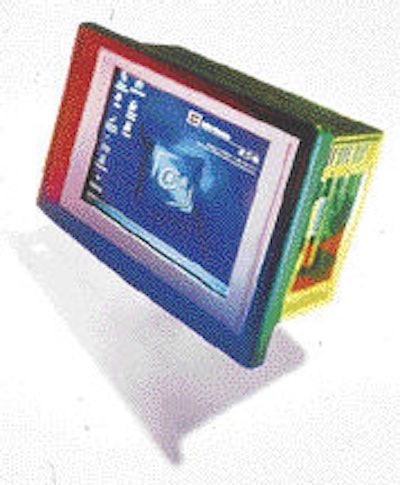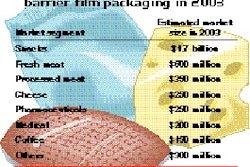More than anything, the depth of the commitment to helping customers solve Y2K problems on packaging equipment related to the size of the machinery company. The larger national suppliers generally had comprehensive plans, while the smaller, regional companies often simply referred questions to their vendors.
One respondent, from a major national machinery supplier, revealed his company's ambitious approach. "We went back seven or eight years and looked at what components we used, and then contacted those companies," he said. "Then we wrote a policy . . . and created a table that shows components in question, components that are not compliant and other components that are compliant as they apply to our machines. We provide this [table] to any customer who asks for it."
Another major supplier of materials handling equipment does supply a "statement" that virtually guarantees the readiness of that company's equipment for the "roll-over" date. However, that firm's respondent admitted that "it's all lawyers' words." Another national builder of machinery issues statements. "We don't offer a guarantee. But we do have a statement that says our machines have been Y2K-compliance validated," the respondent said. "But then [the statement] limits liability. We say that if it turns out something isn't Y2K-compliant, we cannot be held responsible for resulting problems or damage." This company will work with customers to correct any problems that they may have.
A smaller manufacturer of stock machines provides a written guarantee because the machines carry no time-sensitive systems, its representative said. But there is also a clear proviso in that guarantee, he added, that eliminates liability if the machine has been at all altered by a third party like a systems integrator.
Another national supplier of capital equipment has already performed a lot of the research into fixing any problems. First, this company contacted any suppliers of date-sensitive hardware or software. Then, its Y2K specialist reported, the company used third-party software vendors to test the systems. "That's how we determined which machines needed upgrade paths."
Some costs involved
The representative of a large manufacturer of packaging systems said his company took a proactive approach. "We contacted all customers that have machines that might not be Y2K-compliant, and we provided them with a solution that they could purchase. Or they could go elsewhere for a solution. For the most part, these customers bought our upgrade."
Another manufacturer relates costs to machine warranty. "If the machine is out of warranty," its representative told PW, "we tend to send the customer to the component supplier. If they want us involved, we'll service them. But we charge them for our time."
That's similar to the comments from a manufacturer of materials handling machinery. "Out-of-warranty equipment is the customer's responsibility," said the firm's Y2K specialist. He adds that the company will send a technician to audit the customer's equipment, and the warranty determines if it's billable time.
Others offer the solutions at no cost. The contact for a large maker of packaging and converting machines said his company offers customers a step-by-step process to determine compliance. "If the machine requires new software, in many cases we supply it free. Mainly, we can take care of the problem by following a procedure that resets the dates."
Responsibility--usually
Machinery makers generally accept some responsibility for the performance of the equipment, more so than the controls suppliers (see p. 66). "It will be a shared responsibility," said the representative of an international manufacturer of machinery. "Packagers have a responsibility to their customers to be sure they can supply product, and we have a responsibility to our customers to be sure their machines run. And to be proactive about finding solutions."
Another national machinery builder agreed, but said the real responsibility depends on that warranty. "For 'legacy' equipment, it's up to the customer to identify a problem and contact us for a solution," said the company representative. "For new equipment, it's totally our responsibility." Most smaller machinery builders agree.
Still others view it differently. A representative of a maker of packaging systems said responsibility should be related to the sales contract. "If a customer purchased the equipment and Y2K compliance was a requirement, it should be in the contract. If the contract did not specify compliance, then it's the customer's responsibility." Another likens the Y2K problem to ongoing maintenance, saying his company would work with the customer just as if there were any other problem with a machine.
The respondent of an international manufacturer tended to agree. "Responsibility is a question with a lot of dollar signs around it. I think it rests mainly with the customer. Just like at home, I have to get my PC fixed if it needs fixing. When I bought it, Y2K was not an issue, so I don't expect the manufacturer to fix my computer."
A regional machinery maker pointed to the controls suppliers. "From a selfish point of view, we need to look at them. If we were designing from a board level, then it would be [our] responsibility. But we're not. We're paying them a lot of money for their products and their design, and they should be responsible for it."
The last word goes to the representative of the maker of materials handling equipment. "I believe the lawyers will pick some date when we all knew there was a problem-- Jan. 1, 1998, for us," he said. "For newer equipment, the responsibility is shared with controls suppliers, but the customers will look to us, as they should."
Through all the dialogue, most machinery makers appear to have consciously invested in finding answers to any potential problems. They may be free, or they could be costly. But, for the most part, packagers should be confident that, if they've done their homework, the solutions will work to keep their equipment and companies operating.


























